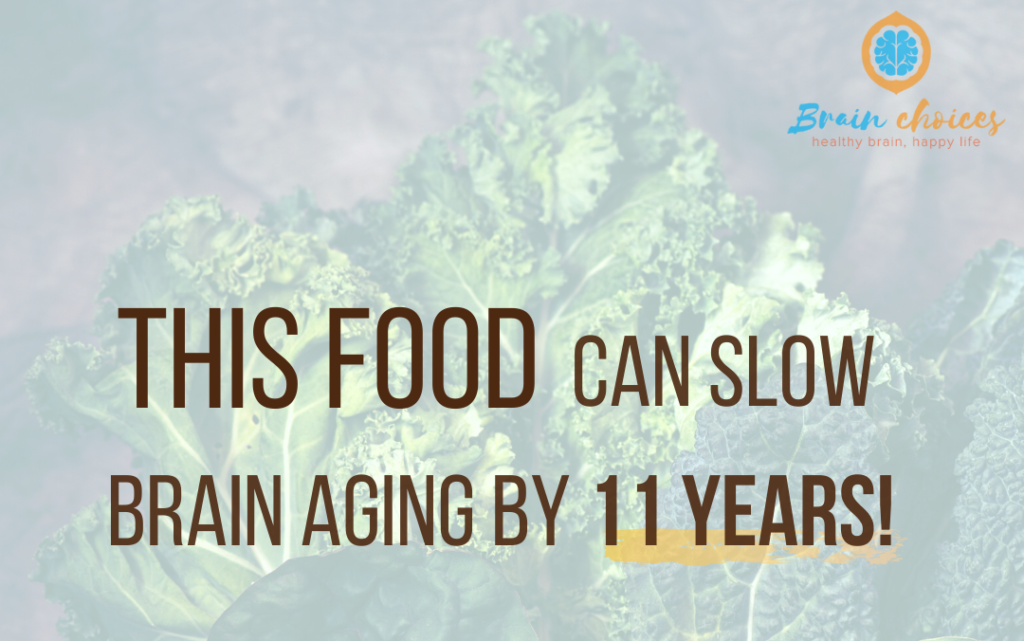
We have all heard that dark green leafy vegetables, like spinach, kale, collards, arugula, are super healthy. But did you know that they are especially healthy for your brain?
Studies have found that eating greens daily can have a strong protective effect against cognitive decline.
A prospective study published in the journal Neurology in 2018 considered 960 participants between the ages of 58 and 99. They followed this group for 4.5 years. They found that consumption of green leafy vegetables was associated with a slower cognitive decline (after excluding the effects of age, sex, education, participation in cognitive activities, physical activities, smoking, and seafood and alcohol consumption). In fact, they concluded that consuming approximately 1 serving per day of green leafy vegetables may help to slow cognitive decline in an equivalent of having 11 years younger brain. Wait, did you read that well?! 11 years!!!!!

By serving they mean 1/2 cup cooked greens or 1 cup raw greens.
In the image below (taken from the study itself), you can clearly see the decrease in the decline of the global cognitive score for the people eating the most green leafy vegetables (blue line) compared to the people eating the least (red line).

The individual nutrients found in greens and that were investigated in this study that were especially beneficial were vitamin K1, lutein, nitrate, folate, kaempferol (a flavonoid), α-tocopherol (a type of vitamin E), and β-carotene.
They also investigated whether this effect was due to cardiovascular conditions, depressive symptoms, low weight, and obesity. But no, the green leafy vegetable effect remained unchanged and statistically significant!
So they concluded that eating 1 serving of green leafy vegetables may help to preserve cognitive function and reduce memory loss as a person grows older, perhaps due to the neuroprotective effects of lutein, folate, β-carotene, and vitamin K.,
In their words “the addition of a daily serving of green leafy vegetables to one’s diet may be a simple way to contribute to brain health”.
The study’s findings corroborate an existing body of scientific evidence that suggests that leafy green vegetables contribute to brain and mental health.
Another two interesting studies published in 2015 in the journal Alzheimer’s and Dementia [2, 3] reported that those who most adhere to the Mediterranean-DASH Intervention for Neurodegenerative Delay (MIND) diet could reduce their risk of Alzheimer’s disease by 53% [3] and that the MIND diet slows cognitive decline by 7.5 years [2]. This diet, developed by Dr. Morris and her colleagues, specifically captures dietary components shown to be neuroprotective: dark leafy greens, whole grains, berries, fish, nuts, and beans.


How to incorporate more greens in your diet

Getting 1 daily serving of leafy greens is easy, even if you don’t like salads. Here are some ways to incorporate more greens in your diet:
- Smoothies: add 1 or 2 handful of spinach or kale into your blender together with other brain-boosting ingredients such as berries, seeds and nuts.
- Pestos: you could make a spinach-basil pesto! Or a wild garlic pesto (when it-s in season).
- Salads: this is the obvious way. Add other raw veggies, nuts, seeds and olive oil.
- Wraps. Use romaine, collard, or Swiss chard leaves as wraps.
- Sandwiches: add some green leaves (arugula for instance) to your wholegrain bread sandwich.
- Cook it: you can simply cook your greens and eat it like that.
- Omelet or scrambled eggs: add your chopped greens to your eggs and make an omelet or scrambled eggs.
- Dips, spreads and sauces: add some greens to your dips to your dips, spreads and sauces (you can blend or not).
Are there other ways you like to use greens?
Did you know that greens are so good for our brain?
Let me know in the comments! 🙂
Ana Coito, Ph.D.
References
[1] Morris et al. Nutrients and bioactives in green leafy vegetables and cognitive decline: Prospective study. Neurology (2018). 90(3):214-222.
[2] Morris et al. MIND diet slows cognitive decline with aging. Alzheimer’s and dementia (2015). 11(9):1015-22.
[3] Morris et al. MIND diet associated with reduced incidence of Alzheimer’s disease. Alzheimer’s and dementia (2015). 11(9):1007-14.




Loved this post, and the recomendations are great, nailed it!
Hi, very interesting info to read. Thank you!
I knew greens were great for your brain but this just confirms it. I have a garden full of chard kale spinach bok choy and broccoli rabe.
That sounds great Jennifer! And self-grown veggies are for sure the best!